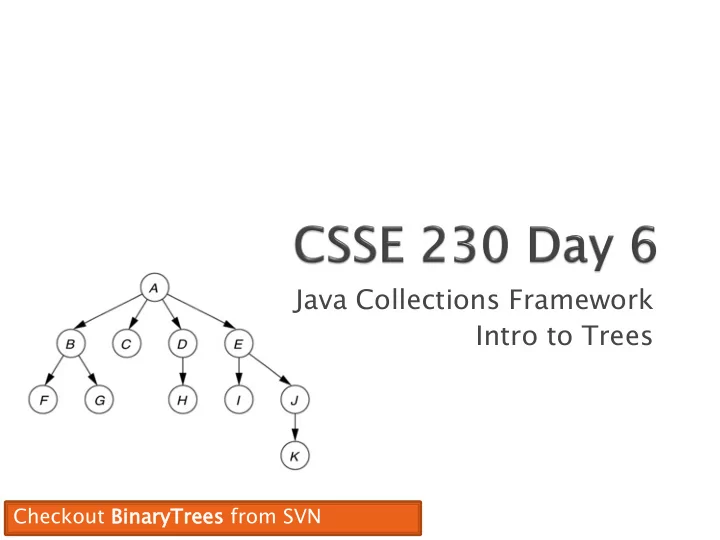

Java Collections Framework Intro to Trees Checkout Bina naryTree ees from SVN
Part of written assignment 3 ◦ Examine the Code of Ethics of the ACM Focus on property rights ◦ Write a short reaction (up to 1 page single-spaced) ◦ Details are in the assignment
No prima donnas ◦ Working way ahead, finishing on your own, or changing the team’s work without discussion: harms the education of your teammates No laggards ◦ Coasting by on your team’s work: harms your education Both extremes are selfish may result in a failing grade for you on the project
I’ll assign an overall grade to the project Grades of individuals will be adjusted up or down based on team members’ assessments At the end of the project each of you will: ◦ Rate each member of the team, including yourself ◦ Write a short Performance Evaluation of each team member with evidence that backs up the rating Positives Key negatives
Exce celle llent—Consistently went above and beyond: tutored teammates, carried more than his/her fair share of the load Ver Very good good—Consistently did what he/she was supposed to do, very well prepared and cooperative Satisfac actory ry—Usually did what he/she was supposed to do, acceptably prepared and cooperative Ordin rdinary—Often did what he/she was supposed to do, minimally prepared and cooperative Marg rginal—Sometimes failed to show up or complete tasks, rarely prepared Deficie cient—Often failed to show up or complete tasks, rarely prepared Unsati tisfa facto tory—Consistently failed to show up or complete tasks, unprepared Superf rfici icial al—Practically no participation No s sho how—No participation at all
Q2 Done with an interface, e.g., java. java.util. il.Colle llection A “factory method”
Introduction and terminology
Class hierarchy tree (single inheritance only) Directory tree in a file system
Q5-7 A collection of nodes Nodes are connected by directed edges. ◦ One special root node has no incoming edges ◦ All other nodes have exactly one incoming edge One way that Computer Scientists are odd is that our trees usually have their root at the top!
Q8 Parent Child Grandparent Sibling Ancestors and descendants Proper ancestors, proper descendants Subtree Leaf, interior node Depth and height of a node Height of a tree
Q9-14 14 The height o of f a tree a tree is the height of its root node. Which is larger, the sum of the heights or the sum of the depths of all nodes in a tree?
A Binary Tree is either ◦ em empty ty, or ◦ con consists sts of: a distinguished node called the root, which contains an element, and A left subtree T L , which is a binary tree root A right subtree T R , which is a binary tree T L T R
Let’s implement a ee<T> class including BinaryT BinaryTree methods size() size() , height( height() , e() , and contain (T) . duplica duplicate( contains(T
Recommend
More recommend